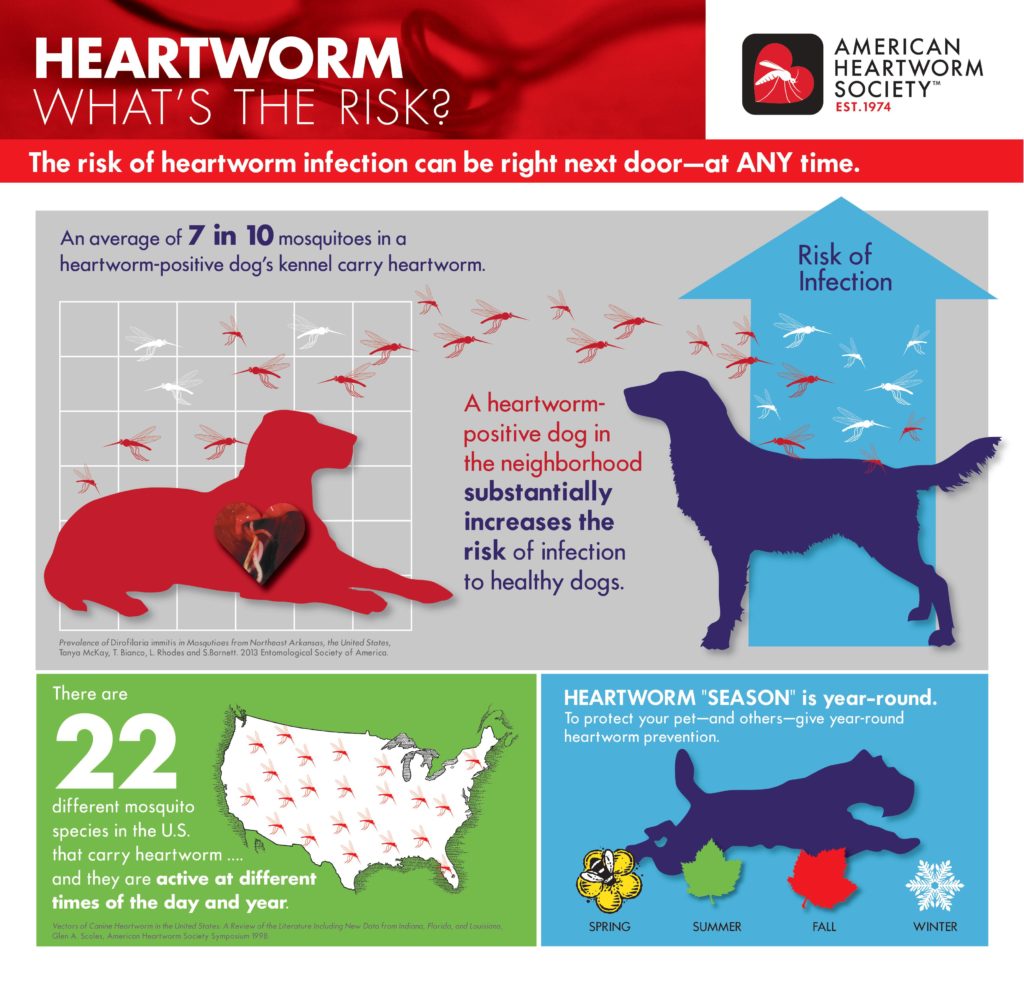Spring is upon us and many of us are starting to think ahead to the warmer days that are coming! With the increasing temperatures comes more time outside, going to the beach, campfires and the dreaded scourge of mosquitos.
Heartworm disease is a potentially fatal condition in pets, spread by mosquitos, in the United States and other parts of the world. It is caused by worms that live in the heart, lungs and associated blood vessels that can cause severe lung disease, heart failure and damage to other organs of the body. Heartworms are spread through the bites of a mosquito and movement of worms through the bloodstream. When a mosquito bites and takes a blood meal from an infected animal, it picks up these baby worms (microfilaria) which develop and mature into the infective stage. When that mosquito moves on to other animals it can now infect new animals. Once inside the new host, it takes approximately 6 months for the microfilaria to mature into adult heartworms and deposit within the heart. Once mature, heartworms can live for 5-7 years in dogs and up to 2-3 years in cats.
In the early stages of the disease, many dogs show few symptoms or no symptoms at all. The longer the infection persists, the more irreversible damage is done. Signs of heartworm disease may include persistent coughing, exercise intolerance, decreased appetite, and weight loss. Advanced heartworm disease can cause heart failure, fluid accumulation within the abdomen and caval syndrome when the sheer mass of worms within the blood vessels cause blockage of blood flow to vital organs. Many dogs with advanced heartworm disease will die. In cats, signs of heartworm disease can include coughing, asthma like attacks, vomiting, decreased appetite and weight loss. Unfortunately in cats, the first sign in some cases is sudden collapse or death.
Did you know that heartworm disease has been found in all fifty states? Heartworm disease may not seem like a problem in your community but multiple variables including changes in climate, presence of wildlife carriers, and movement of infected dogs across the country are contributing to the uptick of cases being diagnosed in regions not previously thought as “hot spots”. After Hurricane Katrina, approximately 250,000 pets were adopted and shipped throughout the country. Many of these pets were infected with heartworms. Currently it is estimated that over a million pets within the US have heartworm disease.
Heartworm prevention is by far the best option for this terrible disease. The American Heartworm Society recommends year round prevention for dog and cats in the US, even in regions that experience cold winters. Heartworm preventatives work retroactively, so an animal that acquires an infection one month must be given heartworm preventatives in the months that follow to be protected. Fortunately, heartworm prevention is highly effective when given faithfully and the year round cost of preventing the disease in dogs is a small fraction of the cost of heartworm treatment.
Dogs should have heartworm tests once a year. The reason for annual testing is to ensure that the prevention is working. All of us forget from time to time-missing even one month will put a patient at risk. It takes 6-7 months for a dog to test positive after it has been infected.
If your pet is found to be positive, don’t panic! Most infected dogs, early in the infection can be successfully treated. The goal is to first stabilize your dog if they are showing signs of disease, then kill both the adult and immature worms while keeping the side effects of treatment to a minimum.
So, when you are scheduling your fun vacations, camps for the kids and stocking up on sunscreen and bug repellant double check to ensure that your dog is up to date both on their testing as well as making sure you have enough preventative to not run out.

Dr. Christine Klippen received a BS in Animal Sciences from Colorado State and a BS in Nursing from George Mason University. She attended Colorado State University for veterinary school and has been working in specialty hospitals since 2009. Dr. Klippen is part of our Emergency & Critical Care team and has a special interest in critical care, toxicology, trauma and education.

